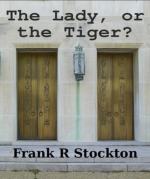
|
| Name: _________________________ | Period: ___________________ |
This test consists of 15 multiple choice questions and 5 short answer questions.
Multiple Choice Questions
1. What does the courtier do upon entering the arena in Part 4 of the story?
(a) He bows to the jury.
(b) He beats on the door.
(c) He bows to the king.
(d) He bows to the judge.
2. For how long does the princess's love affair with the courtier last before the king finds out?
(a) Many years.
(b) Two weeks.
(c) One month.
(d) Many months.
3. How does the narrator describe the fairness of the arena in Part 3?
(a) "Its perfect fairness is obvious."
(b) "Its fairness, or lack thereof, was cautionary."
(c) "It was as fair as the guillotine."
(d) "Its fairness was much disputed."
4. What word from the narrative means ordinary or undistinguished?
(a) Responsible.
(b) Devolved.
(c) Coronary.
(d) Commonplace.
5. What word in the text refers to the act of performing of a ceremony?
(a) Solemnize.
(b) Recitative.
(c) Aria.
(d) Oration.
6. What does the word "subordinate" mean in the narrative?
(a) Inferior or secondary.
(b) Ordinary or plain.
(c) Painful.
(d) Exemplary.
7. What do the dancing maidens enter the arena with if the criminal is proven innocent?
(a) Crowns.
(b) Golden horns.
(c) Babies and sheep.
(d) Kittens.
8. The narrator says in Part 3 that "the thinking part of the community could bring no charge of" what?
(a) "Unfairness against the plan."
(b) "Justice in the institution."
(c) "Retribution in the king's trials."
(d) "Incorrigibility to the institution."
9. In Part 4 of the story, the narrator describes the judgment of the masses regarding the courtier by saying, "Of course, everybody knew that the deed with which the accused was charged had" what?
(a) "Been done."
(b) "Been set up."
(c) "Not been done."
(d) "Been fabricated."
10. What word from the narrative refers to an established law or custom?
(a) Institution.
(b) Dictation.
(c) Coronation.
(d) Proscenium.
11. How does the narrator describe the location of the tiger in the arena?
(a) "The tiger was always waiting behind the red door."
(b) "The tiger was always located behind the door that was chosen."
(c) "On some occasions the tiger came out of one door, and on some out of the other."
(d) "The tiger was always located behind the left door, but the criminal wouldn't know that."
12. How does the princess signal to the courtier in the arena?
(a) With her left hand.
(b) By blinking.
(c) By tilting her head.
(d) With her right hand.
13. How do the masses respond to the appearance of the courtier in the arena in Part 4 of the story?
(a) "His appearance was greeted with cheers and screams."
(b) "His appearance was greeted with a low hum of admiration and anxiety."
(c) "His appearance was greeted with fear and trepidation."
(d) "His appearance was greeted with murmurs of disapproval."
14. Who surveys the kingdom for "maiden youth and beauty" in Part 4 of the story?
(a) "Competent judges."
(b) "The princess."
(c) "The king himself."
(d) "The prince."
15. How does the narrator describe the king's feelings about his daughter in Part 4?
(a) "She was the apple of his eye."
(b) "She was an annoyance to him."
(c) "She was the bane of his existence."
(d) "She was his greatest worry."
Short Answer Questions
1. How does the narrator describe the fate of the accused person if he found himself innocent in the arena?
2. Of the princess, the narrator says in Part 4 that "she had done what no other person had done." What did the princess do?
3. What are the two outcomes for the criminal depending on his choice of door in the arena?
4. What does the narrator say regarding the situation if a criminal was proven innocent in the arena and happened to have a wife and family?
5. Of the king's viewpoint in Part 4, the narrator says, "No matter how the affair turned out, the youth would be" what?
|
This section contains 704 words (approx. 3 pages at 300 words per page) |

|




